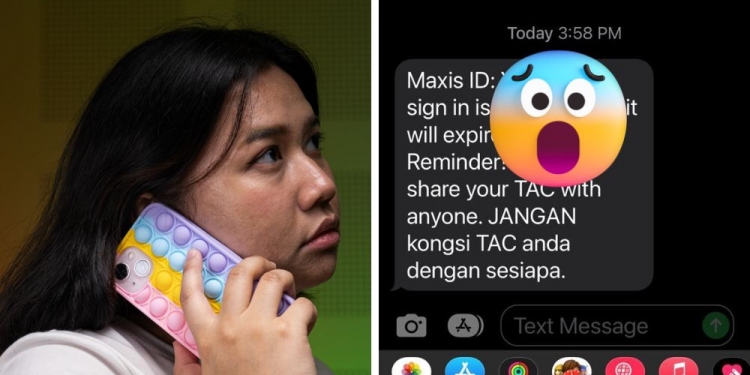Brace yourselves, folks. You’re about to read about yet another tactic that scammers are trying to use in order to get sensitive information off you. This time, it involves getting an official SMS from Maxis and a suspicious call claiming it’s Maxis.
Twitter user Carmen Chee shared on Twitter that she received an SMS first by Maxis—yes, the actual official Maxis. However, instead of getting an SMS phishing scam (or smishing, as I just found out) trying to get a victim to text back, it’s one of the SMSes that send you the safety TAC numbers.
Usually, you’d get this SMS sharing a private TAC number that only you should know and type in where it’s necessary. These SMSes are only prompted when you’re trying to get into your private account. So this means that someone was definitely trying to hack into their account.
Chee also shared that she received a call through WhatsApp right after receiving the SMS. It’s likely that whoever was on the other line was trying to get the sensitive TAC number from Chee. And if you’re in a panic state, you might not even notice that the number comes from another mobile number—not even from a private number or official looking landline-type number.
Hi, sorry to hear about this matter. It is a scam and please do not share any of your personal details or TAC with that caller to avoid any inconveniences. Thank you for highlighting to us for further action. TQ
— Maxis (@MaxisListens) September 3, 2022
After tagging Maxis on Twitter, the company stated and confirmed that this is, in fact, a scam. They also advised users not to share any personal details or TAC with the caller.
A quick search on Twitter also revealed what these Maxis and WhatsApp related scams have been around for some time now. For example, a user reported that a scammer claimed that they have won a bonus and that they need to collect it. That scammer will also ask for your Maxis ID TAC.
Giving away access to your Maxis account is risky, as it can be potentially misused to change details or make purchases in-app. If you want a more detailed read to help you note what else scammers can do to try and get sensitive information off you, I made a slightly deeper investigation piece.
Maxis also has its own PSA page to help give customers tips on how to protect themselves online. The company writes on their page that when it comes to phishing scams, scammers often pose as real businesses like Maxis using phishing emails, SMS, and WhatsApp. They also stress that Maxis would never request a customer’s credit card details or PIN number.
[ SOURCE ]








